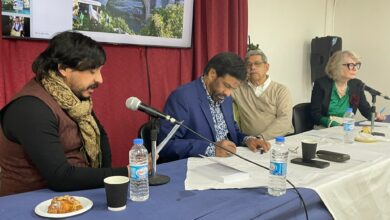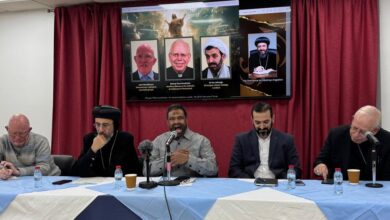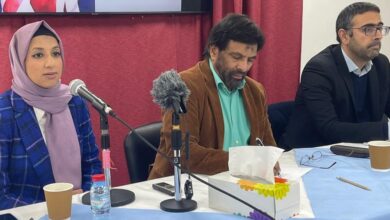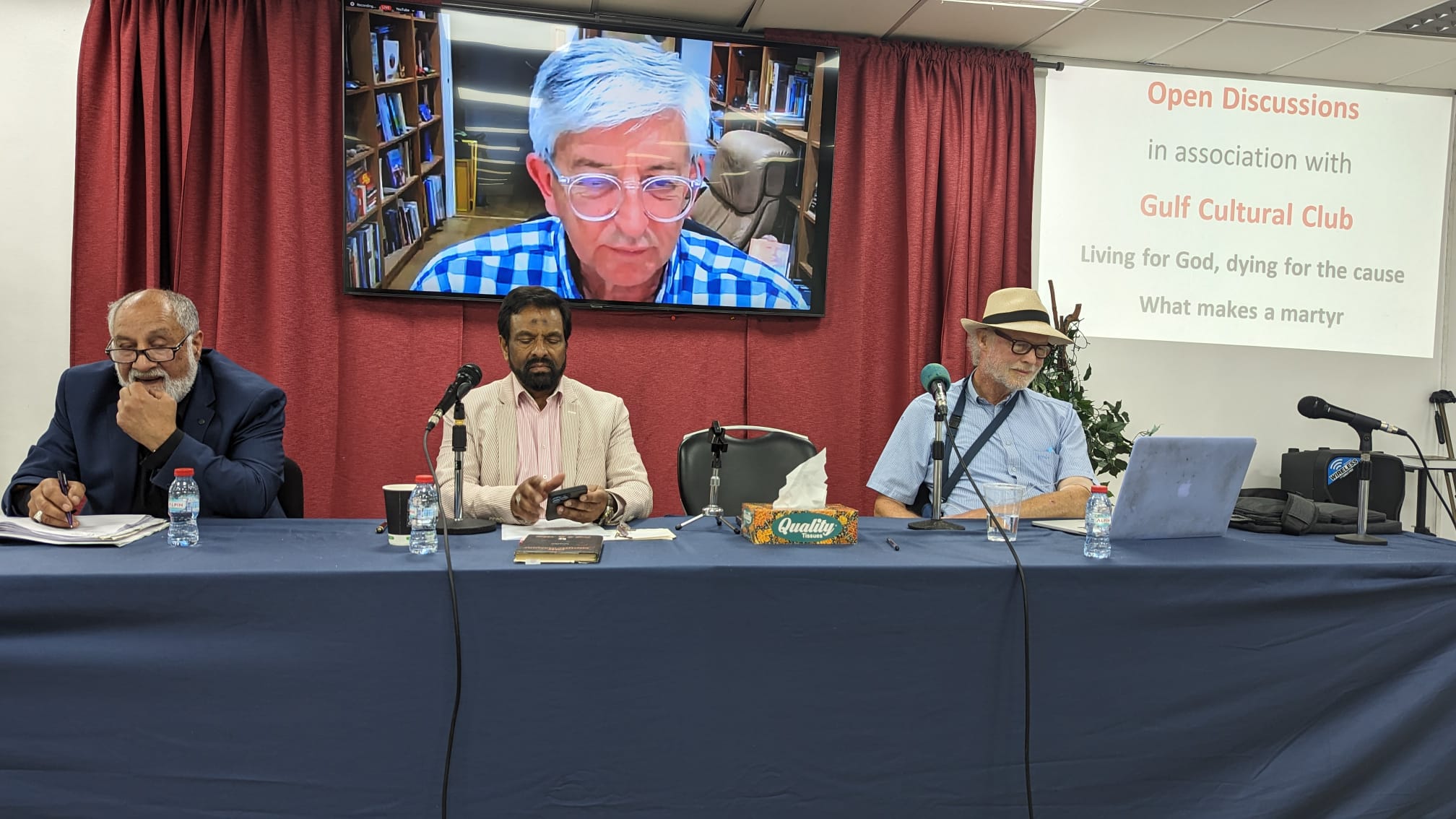
Living for God, dying for the cause. What makes a martyr?
Good causes always have martyrs. These are the individuals who dedicate their lives to the cause, impersonate it, live it to the full and do not compromise in their pursuit to achieve it. Throughout history martyrs have stood out as sources of hope to their followers, attracting the respect and love of many and becoming beacons for positive change. They are described as selfless, candles (which burn themselves to give light to others), heroes, icons and immortals. In Islam, martyrdom is considered the highest status in societies. Martyrs are described as the “Living dead”, the immortals and the eternal witnesses of the struggle between right and evil. As the advent of Ashura approaches, many Muslims will commemorate the life, the struggle and the martyrdom of Imam Hussain, Mohammed’s grandson who was slain in the year 680 AD together with 72 of his relatives and companions. Martyrdom assumed new meanings in Karbala, Iraq where the massacre of the most pious took place.
William Haines: It is a great honour to come here again. We are talking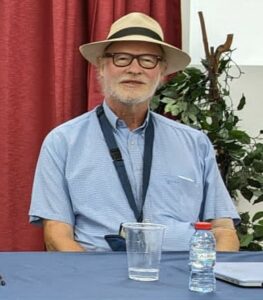 about martyrdom today and I think first of all we should look and see what martyr means. Coming from the Greek word it means witness. I think it has a similar meaning in Arabic
about martyrdom today and I think first of all we should look and see what martyr means. Coming from the Greek word it means witness. I think it has a similar meaning in Arabic
A martyr is someone who suffers persecution and death for advocating or refusing to renounce a religious belief as demanded by an external party. The early Christians saw Jesus as the first and greatest martyr, on account of his crucifixion. He was not the first prophet to be martyred. The first was Able. The gospel passion narratives have led many scholars to conclude that they are martyrdom accounts in terms of genre and style. The gospels are mostly about the last few days of the life of Jesus and all the things that happened to him in the final week before his death. The first Christian witness to be killed for his testimony was Saint Stephen (whose name means “crown”), and those who suffer martyrdom are said to have been “crowned”.
So to understand the Christian view of martyrdom and that Jesus was the first martyr we need to understand a little bit about the life and teachings of Jesus and the most important thing to understand is context. All the prophets in the bible were not speaking in the abstract like Buddha. They were all addressing the political and social reality of the world in which they lived. So if you want to understand the teachings of Jesus you need to understand the social and political reality of the world in which he lived.
So what is the reality of Jesus time? It was the Roman occupation. So who were the Romans? You have to understand that there was the culture of the Romans. So the founding myth of Rome was two brothers and one killed the other. The dominant view of Roman culture and society was that might is right, control and oppression.
The Roman Empire as you probably know is very militaristic and expansionist. They glorified war and you had the gladiators and wild beasts in the Colosseum. They seized territory so as to extract wealth. By the invasion of Egypt which was the bread basket of the Mediterranean at the time they gained wheat to be able to send it back to keep the Roman mob quiet. So it was very greedy with taxation and exploitation of the empire. So that is the kind of thing that was going on there. When we look at them they are incredibly brutal. This took place in the Colosseum and you wonder where the money for the building of the Colosseum came from. The money came from the destruction of Jerusalem. They robbed the temple in Jerusalem of all the gold and all the tides from Jews from around the world and they took that gold and they rebuilt Rome including the Colosseum where the Christians were then martyred.
So the Romans occupied Israel, they violated the temple they controlled the high priest. And any Jews who refused to pay the tax were punished. There were four towns who refused to pay the tax. The Romans said you are going to pay the tax whether you like it or not so they paid the tax by being sold into slavery. That is the reality of the Roman occupation of Israel. The bulk of the money collected was sent to Rome and paid into Emperor Augustus’s personal account. Typical occupation.
So the question is how did the Jews respond to this? There are many messianic uprisings at that time. The Jews hated the Romans. They revolted more than any other people. They had a strong religious, national & political identity. They had a long history and high culture – , much longer than that of the Greeks or the Romans. Their high culture can be seen in their literature. The Romans looked down on the Jews. They saw them as different. They were monotheistic. They had dietary laws such as kosher and a whole host of things that made them different to the Romans and the Greeks. This is an incredibly tense situation and it is going to lead to some kind of war or uprising. So the question is how are we going to solve it and prevent a catastrophe?
Jesus was not a religious teacher in the sense that Buddha was. He was trying to address the social and political reality of the time. So if we want to understand the teachings of Jesus we have to understand them in this context. That is what he was trying to solve.
So what were his plans to address the reality of the Roman occupation? So if you look at the teachings of Jesus from the sermon on the mount you heard him say an eye for an eye and a tooth for a tooth. That is from Exodus and Mosaic law – if someone hurts you you have the right to hurt them back.
This is a sort of reciprocal justice. The question is what kind of reciprocal justice? So in this eye for an eye, the idea was a measure for measure. Tit for tat where the victim received the value of the injury in compensation. The intent of this principle is that the compensation is for the value of the loss. So an eye for an eye. In reality, the Jews did not go around knocking each other’s eyes and teeth out. It was the principle of measure for measure. If you get your finger cut off in a factory you get a certain amount of money, if you get an arm cut off you get a certain amount of money. You don’t go up to the owner of the factory and say my finger got cut off because you didn’t maintain the machine give me your finger I am going to cut it off. It doesn’t work like that. The problem is that it could easily lead to a feud.
The chief moral obstacle in the path of reconciliation is the desire for revenge. Now, revenge is commonly regarded as a low and unworthy emotion, and because it is regarded as such, its deep moral hold on people is rarely understood. But revenge – morally considered – is a desire to keep faith with the dead, to honour their memory by taking up their cause where they left off. Revenge keeps faith between the generations; the violence it engenders is a ritual form of respect for the community’s dead – therein lies its legitimacy. Reconciliation is difficult precisely because it must compete with the powerful alternative morality of violence. Political terror is tenacious because it is an ethical practice. It is a cult of the dead, a dire and absolute expression of respect.
So what was Jesus doing then? He said you have heard it said an eye for an eye and a tooth for a tooth but I say to you do not resist an evildoer. And you might say this is just the teaching of weakness. But we have to understand the context in which he was teaching this.
What happens if you resist an evildoer? If you are a child in a playground and there is a bully and you resist the bully you offend the bully, what is he going to do? He is going to beat you up. If you try and retaliate you will get beaten up. A Roman soldier? You do not need to look at Roman soldiers. You just need to go back to the last century. The way the Nazis behaved.
There is a particular massacre that took place in France. During the German occupation of France, the general principle was – 50 innocent Frenchmen to be killed for every German soldier killed. Is that an eye for an eye? No so what do you do? If you are occupied by the Germans what do you do? What is the moral reality? Are you just going to lie down or are you going to resist? And if you resist you know what the consequences will be.
On 9th June 1944, the French resistance captured SS-Sturmbannführer Helmut Kämpfe and the Germans heard he was being held at Oradour-sur-Glane, a small town. In retribution:190 men were locked in barns shot and burned, 247 women and 207 children were locked in a church and burned and the Village of Oradour-sur-Glane was razed to the ground.
So that was the reality if you tried to resist the Roman occupation and a Roman soldier that was what would happen. So that was not the solution. Jesus said do not resist an evildoer but if anyone strikes you on the right cheek give him the left cheek also. So what does that mean in the reality of the time in which he was living?
If you are walking along and you upset a Roman soldier what they might do is hit you. It says strikes you on the right cheek. If I was a Roman soldier and I strike you on the right cheek I will be doing it with the back of my hand with a heavy glove. So it is going to hurt. You will probably end up on the ground. But at the same time striking someone with the back of the hand is a way of treating them with disrespect. It is saying you are my social inferior.
So if get knocked to the ground and you retaliate all that is going to happen is the soldier will take out a sword and you will be dead. Has that solved the problem? No. Another alternative is you have knocked me to the ground I am angry, I am resentful, I hate this person but who suffers? You suffer. The Roman soldier does not know you hate him. The only person who gets damaged by resentment is the person who feels that way. That does not solve the problem.
Another option is to say that the Roman soldier is really powerful. I need to serve them and be servile and say how wonderful they are even though I think something different inside. That will not solve the problem. The Romans would look down on this person. But what Jesus says is that if someone strikes you on the right cheek turn the other also. So what he is saying is you have been struck on the right cheek you have been knocked over stand up and turn the other cheek.
So the Roman soldier is forced to strike you with the inside of this hand which means treating you as an equal. Or to punch you which again means treating you as an equal. So what Jesus is saying is do not retaliate, do not get resentful and hateful, and stand up with dignity and strength. If you did that to a Roman soldier he would be shocked. If you retaliated he would understand that. That is his language. If you behave in a servile way he would understand that because that is how he behaved towards his officers. If you hated him he wouldn’t care. But if you stood up and turned the other cheek he would realise that this person is doing something I cannot do. This person is standing in front of me with dignity and demanding to be treated as an equal. So what is the soldier going to do? Is he going to say okay I will treat you as an equal? That is very difficult of him to do or is he just going to walk away? So this is the traditional interpretation of what to do. Jesus is encouraging people to stand up with dignity. So that requires strength.
So what is Jesus’ programme? He says if someone forces you to go one mile, go the second mile. The reality at that time was a Roman soldier stopped you and said Carry my luggage for one mile. So if someone did that you would say this is so annoying and you would carry the luggage for 2000 paces not thinking this is going to contribute to my 10,000 steps. But Jesus said to go also the second mile.
You have heard it said love your neighbour and hate your enemy but I say to you love your enemy and pray for those that persecute you. So how does that work? So when the Roman soldier comes along and says Carry my luggage and you do it reluctantly with an angry face which is what you would normally do Jesus says to love your enemy. Say I will happily carry your luggage and not only will I happily carry it I will start engaging you in conversation. Where do you come from? Do you have a family? How are things at work? Taking an interest in this person. If you love this person you take an interest in them. You ask them questions and find out what they are really like.
A Roman soldier would be really struck by this. This is not an ordinary person. This is a good person. The Roman soldier would start to feel conscience-stricken because he has inflicted this heavy luggage on this good person. And at the end of the mile, the person actually says I am going to carry it another mile. The Roman thinks this is extraordinary. I have never met anybody like this before. I wish I had a friend like this. I do not have anybody who actually loves me the way that this person loves me. He may not like me but he cares about me. And after the second mile, you can imagine the Roman soldier saying can we meet up again. And the Jew then becomes like a counsellor. He is counselling, guiding and supporting this Roman soldier. At the end you can imagine the Jewish person saying to the Roman soldier would you like me to pray for you? The soldier would say yes and the Jewish person would be praying for this person’s family, his life. And you can imagine turning an enemy into a friend. This was Jesus approach.
Unfortunately, it didn’t work out like that because of the religious and political reality of the authorities and Jesus unfortunately ended up being crucified. But that is what he was teaching in regard to this religious and political oppression. How to turn an enemy into a friend by loving your enemy.
Haj Hashim Nawrozzadeh: What is martyrdom and is martyrdom an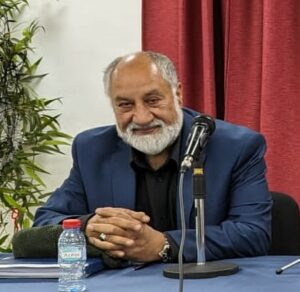 integral part of faith and where would faith be without martyrs? Whichever school of thought you follow you find that what promoted that school of thought and what enriched that school of thought was martyrdom. And martyrdom is a level of attainment.
integral part of faith and where would faith be without martyrs? Whichever school of thought you follow you find that what promoted that school of thought and what enriched that school of thought was martyrdom. And martyrdom is a level of attainment.
There is a hadith from Imam Jaffar Sadeq from the Shia school of thought which says that anybody who dies – any person dies with the love of Ahl Al Bayt in his heart dies a martyr. So anyone who has the love of Ahl Al Bayt in his heart is also defined as a martyr because of the level of devotion that he had.
That is on one level. The moral level. There are many levels of martyrdom which all circulate around sacrifice. The greatest sacrifice was when Abraham took his son to the Mount to sacrifice him. That was a great test and what happened? Even though he took the knife to cut his head the intention was sacrifice. So martyrdom is a sacrifice. It is also a level of attainment.
There are many levels of attainment in respect of martyrdom. The greatest level as you saw on the plains of Kerbala was when the prince of martyrs, was prepared not only to sacrifice his life but the lives of this family. So if we look at martyrdom it is like levels of achievement. But these levels of achievement not only are in relation to imams, spiritual leaders and prophets but they also relate to the layman like me.
Devoting your life to God’s consciousness is a form of martyrdom. We don’t have to go to the battlefield to become a martyr. But if we go like the good Samaritan that is also one way of devotion. So martyrdom is not just going to the battlefield and getting killed. It is a mindset. Every single religion or school of thought has martyrs. Why do they have martyrs? Because when martyrdom is achieved the centre of attention is the school of thought. You only have to read what Charles Dickens, Iqbal. Gandhi and Nelson Mandela said. So it goes beyond just faith. It is humanitarian. And if you look at all the martyrs throughout history – not necessarily Muslim martyrs – they were all family people. They had levels of family values.
So you have to have a conscience. If you look at Christian history they had martyrs. And if you look at other faiths they had martyrs. Jaines, Hinduism, Sikhism. They all had martyrs. Martyrdom is an attainment. You can attain it. I can attain it. You do not need to go to the battlefield to attain it. It is about self-sacrifice. It is about having devotion.
Do you not see on the battlefield what devotion did to reason? If you don’t go you are not following the line of your grandfather who gave his great sacrifice. So it is turning the table. It is revolutionary. You do not need to go to the battlefield. You can stay alive and still be a martyr.
It is what you do, and how you work. Bringing people together from different faiths for a common cause is one form of martyrdom because you are devoting your life to the creator. I came in 1962 to this country but I won’t tell you how old I was because I will give my age away. At the age of seven, I couldn’t speak English but I was made a shepherd in a nativity play for Jesus Christ. I was so happy that they accepted me. That sense that you have been accepted is a great sense.
I was born in Kabul Afghanistan. The first martyr at the end of the day in the Christian school of thought is none other than Jesus son of Mary. And we all accept that martyrdom is a form of promoting the faith. I don’t think there is any faith which can survive without martyrdom whether it is Buddhism, Jainism, Hinduism, Sikhism, Shiasm, or Sunnism. In every single faith whatever it is that brings that faith prominence and sends that message is martyrdom.
I did not do a lot of research. I am not a learned man. I am just a simple person not like the professor here but what I can say to you is this: Bringing people together is a kind of sacrifice. When I was 25 at South Bank Polytechnic studying applied biology on a Friday after our prayers we would go to the chaplain’s house – Philip Joyce – who had just come back from South Africa and we used to go to pray with our Christian brothers and sisters.
And in the first session, we brought the Quran in English and they brought the bible in English. And when I asked them to read the Quran, they were students, and they read the first chapter which is Surah Al Fatahia we read the first chapter which is the Lord’s prayer to our Father and almost everybody was in tears because we realised there is only a ten per cent difference in the first chapter of the Quran and the Lord’s prayer.
If we can call martyrdom a sense of devotion to your faith to your imam everybody at the end of the day has to have faith and if we can call martyrdom that sense of devotion to God’s consciousness and morality then it is the first step.
And that is why we have martyrs. Martyrs are there to remind us that there is a God and we have to answer at the end of the day. Just as there are different forms of jihad – you don’t have to go to the battlefield to perform jihad – you can have the jihad al nafs which is the jihad of the soul. Same with martyrdom there are different levels of the attainment of martyrdom.
From a every simplistic point of view – not from an academic point of view martyrdom is also humanitarian. Martyrdom is going and feeding the poor. It is going out there. There is an English man a very good friend of mine. And when the Bosnians fought in the Balkans and he said I am going to go to Bosnia. He was 78 a devout Christian – that is martyrdom. That is sacrifice. He went and he took truckloads of food and he helped his Muslim brothers in Bosnia and he risked his life.
Don’t think martyrdom is unattainable. You don’t have to die to be a martyr. Thank you very much.
The Revd Dr Stephen Sizer: “The early church’s theolThe early church’s theory of martrydom was born not in synods or councils, but in sunlit, blood—drenched coliseums and catacombs, dark and still as death. The word martyr means “witness” and is used as such throughout the New Testament. However, as the Roman Empire became increasingly hostile toward Christianity, the distinctions between witnessing and suffering became blurred and finally nonexistent.”
martrydom was born not in synods or councils, but in sunlit, blood—drenched coliseums and catacombs, dark and still as death. The word martyr means “witness” and is used as such throughout the New Testament. However, as the Roman Empire became increasingly hostile toward Christianity, the distinctions between witnessing and suffering became blurred and finally nonexistent.”
While persecution and martyrdom are common to all religions, for literally millions of Christians, suffering and death are inevitable consequences of following Jesus Christ.
And the simple reason why the word witness (martur in Greek) became synonymous with martyrdom is because Christians would not stop testifying that Jesus was alive and with them and because they worshipped him alone as their Lord and Saviour.
According to the charity Open Doors, more than 360 million Christians worldwide suffer high levels of persecution and discrimination for their faith – that’s a staggering 1 in 7 believers.
Every year, Open Doors produce an annual World Watch List which ranks the 50 countries where Christians face the most extreme persecution. This year the top ten countries where Christians face the most extreme forms of persecution are: North Korea, Somalia, Yemen, Eritrea, Libya, Nigeria, Pakistan, Iran, Afghanistan and Sudan. A further 40 countries are names where persecution is considered very high.
In the year 2000, Pope John Paul II founded the Commission for the New Martyrs of the Great Jubilee. The commission researched and catalogued all those who died for the faith in the 20th century. They concluded that the “20th century has produced double the number of Christian martyrs [than] all the previous 19 centuries put together.”
“Probably the most well-known case of present day martyrdom comes from Egypt. In 2015, twenty-one men were martyred for their faith by ISIS. They were beheaded one by one for their faith in Jesus Christ. One of these martyrs, Matthew Ayairga, was not a Christian when he was captured. When asked by his executioners if he rejected Jesus Christ, he was moved by the faith he witnessed from the others and said, “Their God is my God”, accepting Christ there on the spot.”
Tonight, I would like to present first, what Jesus taught about persecution and martyrdom; second, how the Early Church interpreted martyrdom; third, summarise the reasons Christians faced martyrdom; and fourth, give a brief history of Christian persecution then conclude with some contemporary examples of Christian martyrs.
What did Jesus Teach about Persecution and Martyrdom?
In the Sermon on the Mount, Jesus not only warned his followers they would face persecution but described it as a blessing from God for which they would be rewarded.
The primary reason for their persecution, insists Jesus, would be because of their association with him. Jesus makes this more explicit in another passage from John’s gospel.
This is why, when the risen Lord Jesus confronts Saul on his way to arrest Christians in Damascus, Jesus takes it very personally.
“Saul, Saul, why do you persecute me?” “Who are you, Lord?” Saul asked. “I am Jesus, whom you are persecuting,” (Acts 9:4-5)
Jesus used graphic language to describe the implications of being his disciples.
“Whoever wants to be my disciple must deny themselves and take up their cross daily and follow me. For whoever wants to save their life will lose it, but whoever loses their life for me will save it. What good is it for you to gain the whole world, and yet lose or forfeit your very self?” (Luke 9:23-25)
The image of a person carrying their cross daily is probably the most graphic to be found in all the teaching of Jesus. A person who carried a cross was going to their death. Jesus calls his followers to literally give their lives to serve him. Following Jesus Christ therefore involves ruthless self-sacrifice and radical service of others.
Jesus went further, predicting that persecution and even death were inevitable for his followers but God would support them. Instead of retaliating, Jesus insisted his followers seek the welfare of their enemies:
“But to you who are listening I say: Love your enemies, do good to those who hate you, bless those who curse you, pray for those who mistreat you. If someone slaps you on one cheek, turn to them the other also. If someone takes your coat, do not withhold your shirt from them. Give to everyone who asks you, and if anyone takes what belongs to you, do not demand it back. Do to others as you would have them do to you.” (Luke 6:27-31)
Although Jesus warned his disciples to expect persecution, he never encouraged them to seek martyrdom. Instead, he instructed them, “When you are persecuted in one place, flee to another.” (Matthew 10:23)
So, it is clear, Jesus taught that suffering, persecution and even martyrdom were inevitable among his followers. But as and when suffering came, if they could not flee or avoid it, they were to rejoice and be glad, because, he assured them, God would be with them, giving them the words to say and would reward them for their faithful witness.
And in the Acts of the Apostles, we read that from the very beginning, the church faced persecution and martyrdom. The most detailed account is found in Acts 6-7 which gives an account of the stoning of Stephen. At his trial, Stephen proclaimed,
The Acts of the Apostles records repeated waves of opposition to the early Christians and in some places outright persecution which also led to martyrdoms. Persecution, however, served to grow the Church as they were scattered but it failed to destroy it.
Acts 8 records what happened after Stephen’s martyrdom.
“On that day, a great persecution broke out against the church in Jerusalem, and all except the apostles were scattered throughout Judea and Samaria…Those who had been scattered preached the word wherever they went.” (Acts 8:1, 4)
What is significant is that Christians never retaliated when they were persecuted. Throughout his short ministry, Jesus exemplified non-violence – none more so in his arrest, at his trial and execution, insisting:
“My kingdom is not of this world. If it were, my servants would fight to prevent my arrest by the Jewish leaders. But now my kingdom is from another place.” (John 18:36)
Christ followers saw persecution and martyrdom as an imitation of Christ. The Apostle James interpreted persecution as God’s way of making them more like Jesus.
Four Reasons Christians were Martyred.
- Christians were persecuted because they followed Jesus.
“Remember the words I spoke to you: ‘No servant is greater than his master.’ If they persecuted me, they will persecute you also.” (John 15:20)
- Christians were persecuted by the Jewish religious authorities because, like Jesus, they were seen as sectarian, a threat to their power, Christians insisted Jesus was the Jewish Messiah and denied the necessity of worshipping at the Temple or offering sacrifices. They also persuaded Gentile proselytes not to keep Jewish rituals and traditions like circumcision because they were saved by God’s grace, not the Law or works. Ironically, before his conversion, the Apostle Paul, then a Pharisee named Saul, was one of the prime instigators of the systematic persecution of Christians in the Middle East.
- Christians were increasingly persecuted by the Roman authorities. They were designated atheists because they refused to sacrifice to the Romans gods or participate in emperor worship. They were thus accused of treason toward the state.
- Sometimes persecution was instigated of economic reasons, by merchants whose trade in pagan religious artifacts was threatened by the growth of the Church. In the Acts of the Apostles there is an account of Christians being persecuted in Ephesus.
Ironically, on more than one occasion, the Roman judicial system prevented the Apostle Paul and his companions from being lynched – both in Ephesus (Acts 19:28-41), but also in Jerusalem where the religious leaders plotted to assassinate Paul (Acts 19:28-41; Acts 21:30-36; 23:12-22).
All of Jesus 12 Apostles died as martyrs, (apart from John who died in exile), convinced that Jesus was the Son of God, the Saviour of the world. Many of the early Church died as martyrs as well.
Contemporary Examples of Christian Martyrdom
I want to close with the testimony of one contemporary Christian martyr who demonstrated by hiswords and actions how the Lord Jesus transformed his lifes. I hope you will find his testimony truly inspiring. I would also commend the testimony of Dietrich Bonhoeffer Archbishop Oscar Romero and Dr Martin Luther King.
Jim Elliott: Martyr
In 1948, a young 21-year-old Wheaton College student named James wrote in his journal, “I seek not a long life, but a full one, like You, Lord Jesus.” A year later, against all advice, he became convinced that God was calling him as a missionary to Ecuador. That year he wrote in his diary, “He is no fool who gives up what he cannot keep to gain what he cannot lose.’ Jim spent most of 1952 in Quito, Ecuador, learning Spanish and orientating to a new culture… Since college days he had been fascinated by a remote Stone Age tribe known as the Aucas.
Jim knew that they had a deserved reputation for killing anyone, Indian or white, who dared to intrude into their land. Nevertheless, he began praying for them and was determined to reach out to them. In September 1955 a pilot with the Mission Aviation Fellowship, Nate Saint, spotted from the air a small Aucas settlement. On Sunday morning January 8th 1956 Nate went up alone and spotted a group of Auca men walking towards their camp. He flew back to the beach with the good news and radioed their wives. “A commission of ten is coming. Pray for us. This is the day.” Together they all sung the hymn:
“We rest on Thee, our Shield and our Defender,
Thine is the battle, Thine shall be the praise.
When passing through the gates of pearly splendour.
Victors, we rest with Thee through endless days.“
A few years earlier aged just 23, Jim Elliott had written:
“I must not think it strange if God takes in youth those whom I would have kept on earth till they were older. God is peopling Eternity, and I must not restrict Him to old men and women… When it comes time to die, make sure all you have to do is die.”
Jim and his four mission partners Nate, Ed, Roger & Pete were indeed called home that Sunday, to “people eternity”. Refusing to use their weapons in self-defence, they were slain by the people they had sought to befriend.
Jim Elliot wrote, “When it comes time to die, make sure all you have to do is die”. One of the first things Jim’s widow, Elizabeth did was tell their story in the book, Through Gates of Splendour. In the months that followed the widows returned to their work among the tribal peoples of Ecuador.
Other mission partners came and continued to reach out to the Aucas. For nearly a year Elizabeth Elliot, with her little daughter Valeria and Nate’s sister Rachel Saint, lived and worked among the men who killed her husband. They discovered why their husbands had been killed as well as the identity of their killers.
“We thought foreigners would kill and eat us,” one Auca said. Another confessed that he had cried after the killings. Each one of the killers, confessed their sin and accepted Christ. One of them, Kimo became a pastor of the Auca village. To demonstrate their faith in Jesus Christ, Nate’s teenage son Steve and daughter Kathy asked if they could be baptised by the Aucas. The baptisms were held at Palm Beach at dawn. Kimo, one of their father’s killers baptised Steve and Kathy along with two teenagers from the village. Near the site of the missionaries’ graves, the two forgiven killers, two of the widows, Marj and Rachel and the four teenagers sang the hymn which the five men had sung near that same spot “We rest on Thee, our shield and our Defender.” That was only the beginning of the miracle.
Auca believers themselves became missionaries to other long-time enemy tribes among whom, Tona, one of the six killers himself became a martyr. For the wives and relatives of the five men, the mute longing of their hearts was echoed by words found in Jim Elliot’s diary.
” Walked out to the hill just now. It is exalting, delicious. To stand embraced by the shadows of a friendly tree with the wind tugging at your coat tail and the heavens hailing your heart – to gaze and glory and give oneself again to God, what more could a man ask? Oh the fullness, pleasure, sheer excitement of knowing God on earth. I care not if I never raise my voice again for him, if only I may love him, please him. Perhaps in mercy he shall give me a host of children, that I may lead them through the vast star fields to explore his delicacies whose finger ends set them to burning. But if not, if only I may see him, smell his garments and smile into my Lover’s eyes — ah then, not stars nor children shall matter, only himself.”
Sheikh Musharraf Hussaini: Salam aleikum. Don’t count those who have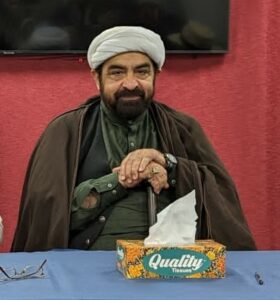 died in the way of Allah among the dead ones. They are living but you don’t understand. We as human beings whatever we do we need to be clear in our aim and objective. Similarly in our life we should be clear about where we are coming from and where we are heading to and what is our aim and objective.
died in the way of Allah among the dead ones. They are living but you don’t understand. We as human beings whatever we do we need to be clear in our aim and objective. Similarly in our life we should be clear about where we are coming from and where we are heading to and what is our aim and objective.
And before we calculate all these points we need to understand do we have a creator or were we just born by chance with the big bang and all the theories that we listen to. If we were born by chance then you only live once so eat, drink and enjoy and don’t worry about anything.
But if we were created by someone then we have a creator and we need to understand why we were created, what was the aim and objective for us to be born in this world. So if we come to the conclusion seeing the signs of the creator a universe within us and a universe outside us. Then we come to the conclusion there is a creator and he created us with an aim and objective.
Those people who have that mental level, educational level and understanding level come to the conclusion that they should submit to the creator and they submit that that creator, that our life will be according to the patterns of the creator – what he created us for. At that point their life becomes a life with an aim and an objective. They do not live without an aim and objective for life. Therefore everything they do is governed by the likings and dislikings of the creator.
When the creator created us he had a system for us. The whole universe is moving in a system: the system of blessings, the system of rahma. He introduced himself in the first verse of the Quran: Al Rahman, Al Rahim, they are both from blessings. But to cut everything short raha means three words. It is the mother’s womb and the place where we nourish and flourish, physically, spiritually and mentally.
So when we join the system of Allah’s blessings where the universe, the stars the galaxies, the planet, everything is moving we commit that we be part of that great system. A drop of water is a drop of water unless it becomes a part of an ocean. When it becomes a part of an ocean that great system of Allah, that is not a drop of water it is the ocean. People call it the ocean. It is eternal and for that sake it struggles. The path of Allah is with love, affection with peace – not force. Allah did not force everyone to become one of the obedients. He said you should accept me of your own free will. Everything in the universe is obedient to Allah with compulsion. He said you human beings submit to me with your own free will. When you submit to me of your own free will this submission will make you the best of my creation.
So when you submit to him you submit to his system. Either you believe in God or you don’t believe in God and all those who don’t submit their requirements are fulfilled by wealth, so they think that is wealth is my Lord. They start being obedient to the wealth and money and fame and all the worldly things they can get with money. But this system of belief in Allah through Adam, Ibrahim, Isa all the 124,000 messengers and the last one the prophet Mohammed, this system is the monotheistic system belief in God and his system.
The materialistic system has always been confronting this system. Anbia have been crucified: they have been going through all these struggles and in this struggle sometimes we do face death. So that death with our blood we write down that this system is the truthful system. This is what we call shahada. When we become a Muslim we recite the shahada. We testify there is no Lord but Allah. First with words, then with actions, then with our blood. And those who write this with their blood like Imman Hussein they try to preserve the sacred system of Allah and to preserve that system they lay down their lives. We are heading to the days of the martyrdom of Immam Hussein who tried to preserve the system because it was in danger from someone within Islam not outside. So this is the shahada. So when you lay down your life you prove that the system is truthful and rightful. Allah says don’t call those who lay down their lives for Allah to be among the dead men. They are living, they are eternal and they get their needs and requirements from Allah.
*William Haines is a pastor and director of education of the Family Federation for World Peace. From 1992 – 1999 he was director of the International Educational Foundation in Russia writing and publishing a series of textbooks for the spiritual and moral education of teenagers in a post-communist society. The books were used in schools all across the former Soviet Union and translated into Mongolian, Azeri and Tajik amongst other languages, They were based the life of the founders and teachings of the traditional religions of the former Soviet Union and its neighbours namely Judaism, Christianity, Islam, Buddhism and Confucianism. The purpose was to inherit the wisdom of traditional religions as well as to understand and respect them. Two of the books, including the one on marriage and family, were published in Arabic a few years ago and are now being used in schools in the Palestinian Territories. William is a qualified religious education teacher and has taught in schools in north west London. He studied at the universities of Manchester, UCL, Cambridge and Unification Theological Seminary in America.
**Sheikh Musharraf Hussaini comes from the family of Yahya Ibn Kaseer Ansari, one of the martyrs of Karbala. He studied Marine Engineering at the Pakistan Marine Academy. His religious education was in Qom. He is a human rights and peace activist working through the Justice 4 Peace Organisation, and a political analyst who has lectured on a variety of topics. He is also a TV presenter hosting TV programmes on social, political and religious issues.
***The Revd Dr Stephen Sizer is the founder and director of Peacemakers, a charity which seek to be catalysts for peacemaking, especially where minorities are persecuted, where justice is denied, human rights are suppressed or reconciliation is needed www.peacemakers.ngo. Stephen is chair of the Convivencia Alliance https://www.convivencia.uk and an executive member of the Israeli Committee Against House demolitions (ICAHD) https://icahd.org. Stephen is a retired Anglican priest. His PhD was a ground-breaking critique of Christian Zionism. He is the author of two books on Christian Zionism. You can access his published writings at www.stephensizer.com
****Haj Hashim Nawrozzadeh was born In Kabul Afghanistan, son of Al Haj Qurban Ali Nawrozzadeh who was one of the pioneers of Muharram Majalis (congregatioons) established in 1967 commemorating the Martyrdom of Imam Hussain (as) and the Household of The Holy prophet of Islam. Haj Hashim Nawrozzadeh is a prominent activist promoting humanitarian causes as well as Interfaith Dialogue and also chairman of The Imam Hussein Foundation Centre in Nth Watford which has an ethos of ‘Educate to Integrate’.

